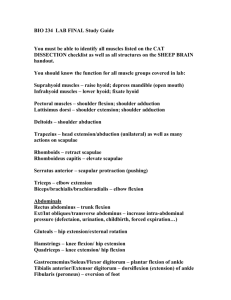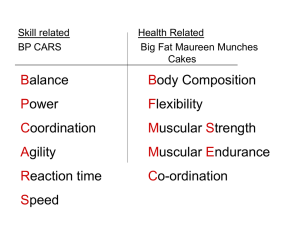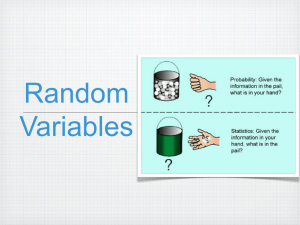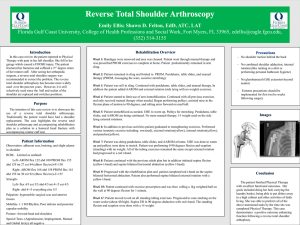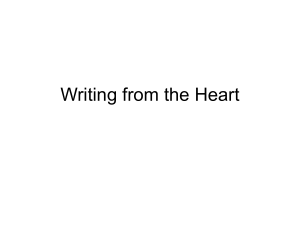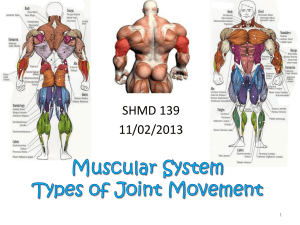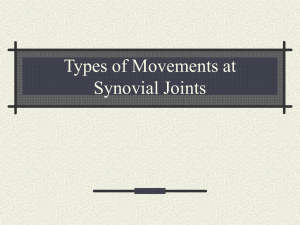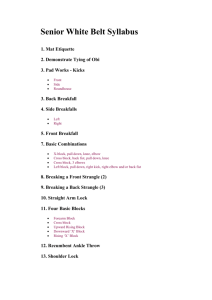Quarterback Throw
advertisement
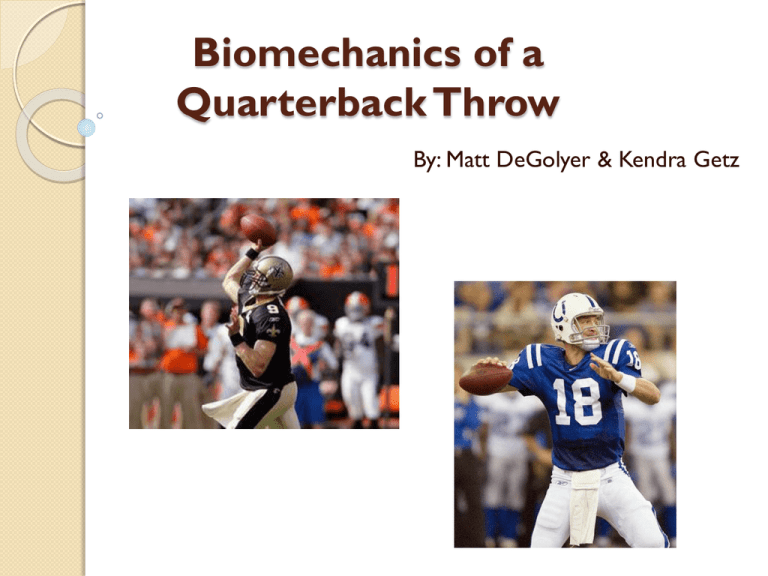
Biomechanics of a Quarterback Throw By: Matt DeGolyer & Kendra Getz Introduction History of QB Throw Role of a QB Throw Phases for QB Throw Visual of Throwing Phases Quarterback Video/Dart-fish Common Injuries History of QB Throw Most historians believe that the QB throw was originated in 1913 but some believe that it came 7 years before that. ◦ “It is the centerpiece of the most popular sport in the country, the play that determines the direction and outcome of most games and makes the NFL quarterback the most important of all team athletes.” (Layden 2010) Benny Friedman '27 Role of a QB Throw A QB throw is used in the offense of a football game to advance down the field through the air. Although there are many variations to this motion of movement, we are examining the ideal or proper motion. Phases for QB Throw Wind-Up Phase Later Cocking Phase Acceleration Phase Follow-through Phase Wind-Up Phase QB is gaining the momentum to release the ball to a receiver. His left foot is in plantar flexion, with his right hip externally rotated with his knee in slight extension. His throwing shoulder is externally rotated, with his elbow in flexion, and wrist in extension. His fingers are in flexion around the football. Later Cocking Phase The QB is starting to go in a forward motion in preparation to throw the football. The QB starts with their left foot placed slightly in front of their right foot for balance with both feet are in plantar-flexion. With his right knee in slight flexion. He will have his right elbow in 90˚ of flexion with his right shoulder in hyperextension. His left elbow is in flexion with his shoulder slightly internally rotated. Acceleration Phase During this phase the QB is releasing the football while opening and hips to where he is throwing the football. His throwing arm is in full extension with his wrist in extension and metacarpals in slight flexion from gripping the ball. His shoulder goes from external to internal rotation. His non-throwing arm is still in flexion throughout this motion. QB’s hip is internally rotated with the left knee in slight extension and the ankle in slight plantar flexion. Follow-Through Phase The QB has released the football at this point and the follow-through is one of the most important phases to a throw. The left ankle is in plantar flexion with the knee in slight extension and the hips are internally rotated. The right ankle is still in plantar flexion with the right knee in full extension. Flexion of the wrist and metacarpals and the shoulder is still going through internal rotation. Visual of Throwing Phases Quarterback Throw http://www.youtube.com/watch?v=xsWrp-yI7eA • Justin Minnich •Junior and QB of the Manchester College Football Team Common Mistakes in QB Throw Proper Form ◦ ◦ ◦ ◦ ◦ ◦ Dropping the elbow Not proper arm toward the target Hip Rotation Follow-Through Shifting weight properly Wrist Movement Ball Grip ◦ Spin motion of the ball Breathing Techniques Work-Cited Page 1. 2. 3. 4. 5. Escamill, R.F. (2009). shoulder muscle recruitment patterns and related biomechanics during upper extremity sport. Sport Medicine, 39(7), Retrieved from http://web.ebscohost.com/ehost/pdfviewer/pdfviewer?sid=ea4111e4-4ccb-4581-b159ad15f8346bac%40sessionmgr14&vid=4&hid=21 Layden, T. (2010). THE ART OF THE PASS. Sports Illustrated, 113(17), 52-60. Retrieved from http://web.ebscohost.com/ehost/detail?sid=50de7128-46d6-4f1b-b8e68c60253dcfce%40sessionmgr15&vid=4&hid=18&bdata=JnNpdGU9ZWhvc3QtbGl2ZQ%3d%3d#db=aph&AN= 54969629 Krishnan, S. G., Hawkins, R. J., & Warren, R. F. (2004). The shoulder and the overhead athlete [pp. 318-339]. Retrieved from http://books.google.com/books?id=BegAqnMt3rwC&pg=PA318&dq=overhead+football+throw&hl=en&ei=SyWTcD1E8XW0QGX79G4BQ&sa=X&oi=book_result&ct=result&resnum=1&ved=0CEgQ6AEwAA#v=onepage& q=overhead%20football%20throw&f=false Wilk, K. E., Reinold, M. M., & Andrews, J. R. (2009). The athlete's shoulder [Second Edition]. Retrieved from http://books.google.com/books?id=fI5Nu030NqIC&printsec=frontcover&dq=the+athlete's+shoulder&hl=en&sr c=bmrr&ei=_iaTZKRAaSU0QHb9vHsBQ&sa=X&oi=book_result&ct=result&resnum=1&sqi=2&ved=0CCoQ6AEwAA#v=one page&q&f=false Iannotti, J. P., & Williams Jr., G. R. (2007). Disorder of the shoulder diagnosis and management [Volume 1]. Retrieved from http://books.google.com/books?id=ssX25YIdAFIC&printsec=frontcover&dq=Disorders+of+the+shoulder:+diag nosis+and+management&hl=en&ei=-ieTZbtKuX50gHRn7C4BQ&sa=X&oi=book_result&ct=result&resnum=1&ved=0CFcQ6AEwAA#v=onepage&q&f =false
